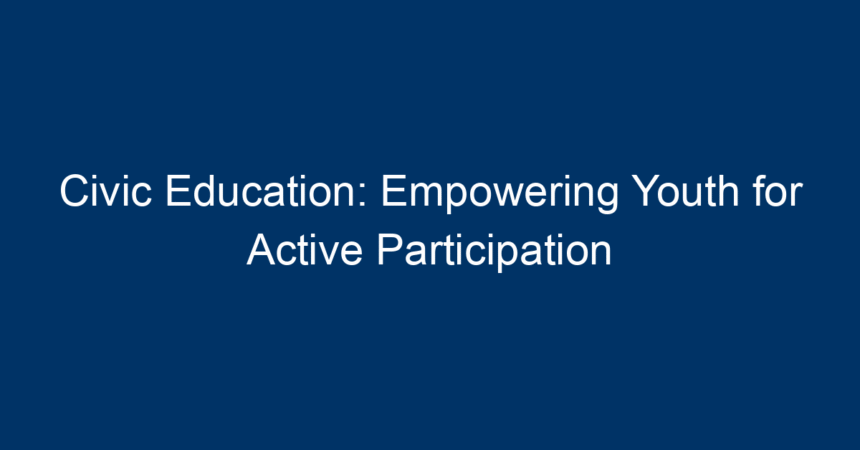In an age marked by rapid social shifts, climate crises, and political polarization, the importance of civic education cannot be overstated. Civic education equips youth with the knowledge and skills they require to become engaged citizens. It goes beyond textbooks, imparting the values of democracy, social responsibility, and active participation. This article explores the role of civic education in shaping a promising future, encouraging youth to step up and make their voices heard.
Understanding Civic Education
What is Civic Education?
Civic education refers to the instruction of individuals, particularly young people, about the principles and workings of their government. It encompasses a broad range of topics including:
- The Constitution and Bill of Rights
- The electoral process
- The importance of civic engagement
- Rights and responsibilities of citizens
Its purpose is to prepare young people not just to understand their rights but also to recognize their responsibilities towards society.
The Goals of Civic Education
The overarching goal of civic education is to cultivate informed, engaged citizens. Key objectives include:
- Understanding Governance: Grasping the functions of local, state, and federal government.
- Promoting Engagement: Instilling a sense of civic duty and encouraging voters to exercise their rights.
- Fostering Critical Thinking: Encouraging youth to analyze political and social issues critically.
- Building Community: Helping young people relate to their communities and understand the impact of their participation.
The Importance of Civic Education for Youth
Fostering Informed Citizens
Civic education provides youth with essential knowledge about their rights and responsibilities. A well-informed citizenry is crucial for the functioning of democracy. Young people must understand how governments operate and their role within these structures. Without this foundation, apathy can take root, leading to lower voter turnout and disengagement from civic duties.
Encouraging Participation
Youth engagement in social and political issues is vital for a healthy democracy. Civic education inspires young people to take part in community initiatives, activism, and in voting. By cultivating a sense of personal agency, civic education empowers youth to influence decisions that affect their lives and communities.
Developing Critical Thinking and Communication Skills
Issues today are complex, often requiring nuanced thinking to navigate. Civic education equips young people with the critical thinking skills necessary to analyze, evaluate, and discuss political issues. Moreover, effective communication skills foster the ability to articulate their thoughts positively and constructively in public discourse.
Promoting Social Responsibility
Civic education emphasizes the importance of community involvement. It teaches young people about social justice, equality, and the interconnectedness of their actions with broader societal outcomes. This awareness nurtures a sense of social responsibility, pushing them to consider how they can contribute to societal improvement.
Effective Strategies for Civic Education
Engaging Curriculum Development
To be effective, civic education must be presented in a relatable context. Engaging curricula that incorporate interactive activities, real-world case studies, and discussions about current events can captivate young minds and foster a deeper understanding of civic principles.
Experiential Learning Opportunities
Hands-on experiences can amplify the impact of civic education. Programs that involve students in community service, local governance opportunities, internships, and youth councils can translate theoretical knowledge into practical engagement. This not only enhances understanding but also builds essential skills for active participation.
Collaborative Learning Environments
Creating spaces for discussion allows students to hear diverse perspectives and develop tolerance toward differing opinions. Group discussions, debates, and collaborative projects foster critical thinking and encourage students to engage in civic issues.
The Role of Technology in Civic Education
Utilizing Digital Platforms
In today’s tech-savvy world, leveraging technology for civic education is crucial. Innovative educational platforms, social media campaigns, and interactive web resources can engage youth and cultivate interest in civic participation. Digital tools can help disseminate vital information, driving a new wave of informed citizens.
Enhancing Access to Information
The internet provides a wealth of resources for educating young people about governance and civic engagement. Online courses, webinars, and virtual workshops can make civic education more accessible, regardless of geographical location.
The Role of Parents and Organizations
Collaborative Efforts
Parents and community organizations play a vital role in reinforcing civic education outside the classroom. Families can discuss local governance, current issues, and civic responsibilities at home, nurturing a culture of engagement. Organizations can support schools by providing resources, mentorship, and community involvement opportunities.
Civic Engagement Initiatives
Nonprofits and local organizations can develop initiatives that promote civic engagement among youth. Workshops, speaker series, and community forums can create platforms for young people to engage actively with civic issues and build their competencies further.
Challenges Facing Civic Education Today
Political Polarization
In an era of heightened partisanship, contextualizing civic education within a balanced framework can be challenging. Ensuring that students receive comprehensive education without bias is essential for promoting civic literacy.
Funding and Resources
Many schools face budget constraints, limiting the resources available for comprehensive civic education programs. Advocacy for funding and support can help enhance civic education initiatives across educational institutions.
Reaching Diverse Audiences
Civic education must be inclusive and cater to diverse communities. Tailoring programs to address varying perspectives and backgrounds ensures that all youth feel represented and empowered within the civic discourse.
Conclusion: Actionable Insights for Empowering Youth Through Civic Education
Civic education is essential for cultivating informed, engaged citizens. By understanding their rights and responsibilities, young people can contribute effectively to their communities and participate actively in democracy. Here are actionable insights for various stakeholders:
-
For Educators: Incorporate experiential learning, collaborative projects, and diverse resources to create engaging civic education curriculums.
-
For Parents: Discuss civic issues at home and encourage involvement in community initiatives. Your engagement can inspire interest in civic education.
-
For Community Organizations: Develop programs that promote civic engagement and provide resources to schools and families, fostering a culture of participation among youth.
- For Policymakers: Advocate for funding and support for civic education initiatives, focusing on inclusivity and diversity to reach all segments of the youth population.
By actively promoting civic education, we empower youth to embrace their roles as engaged citizens. Together, we can foster a generation ready to participate actively in our democracy, ensuring a vibrant future for all.




